African Diaspora @ Budapest Olympiad!
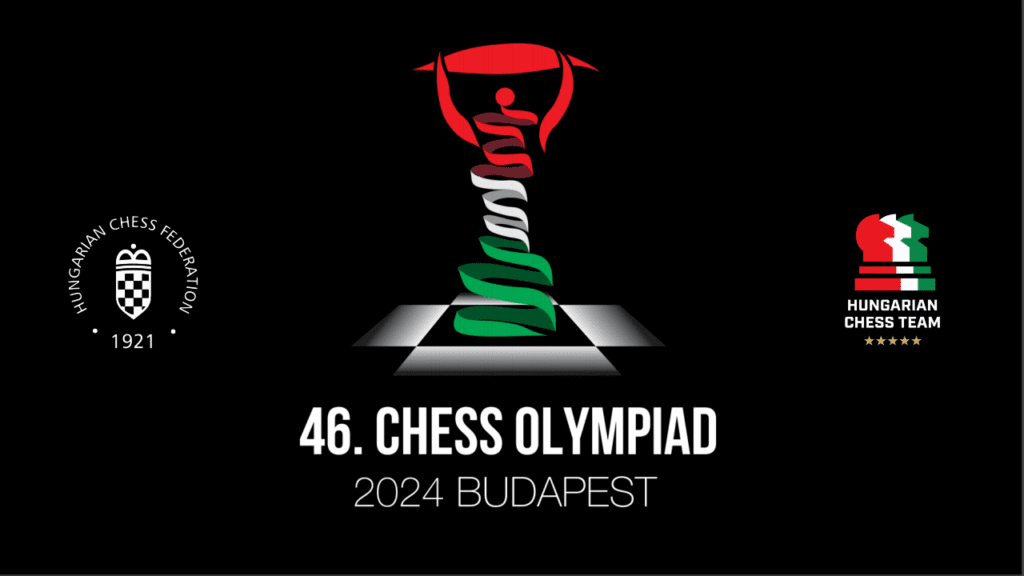
The African Diaspora was again in full force to compete at the Chess Olympiad for honors. Twenty years ago, little attention was paid to smaller nations, and almost no photographs were taken of players and delegates. Photographers and mainstream chess websites focused primarily on the top boards as if there were only 20 teams in the event. For an Olympiad, this is a travesty. If the Olympiad is a festival of nations, who will show that chess is an inclusive and universal sport?
Added Color at Olympiad
The Chess Drum started live Olympiad coverage in 2004 and made a concerted effort to photograph teams and players from the African Diaspora. One thing that stood out is that nations from these countries displayed a more outward display of cultural pride with their national dress and colorful uniforms. Most other nations dressed as if they were playing in a weekend tournament. It did not make for a festive environment or attractive award ceremony. Now it does! Look at the beautiful colors on display!



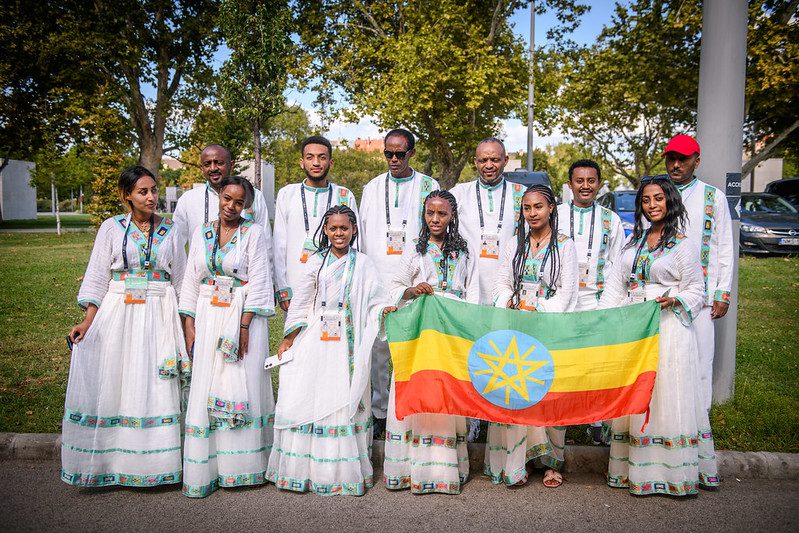


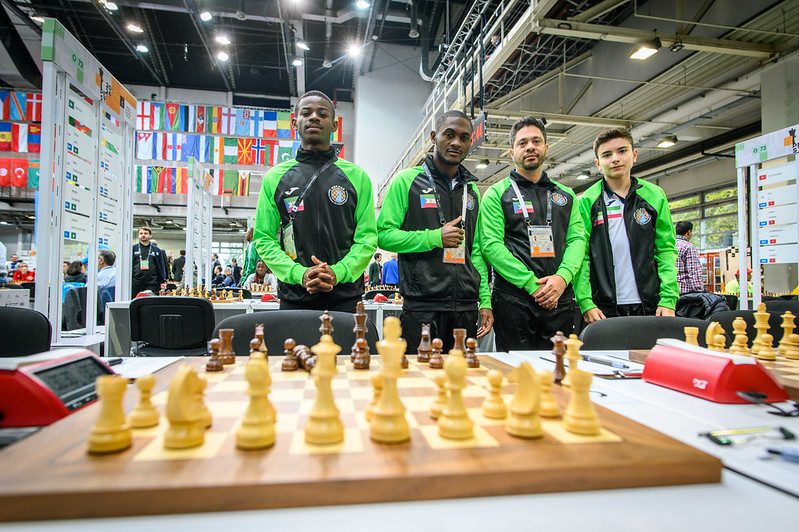






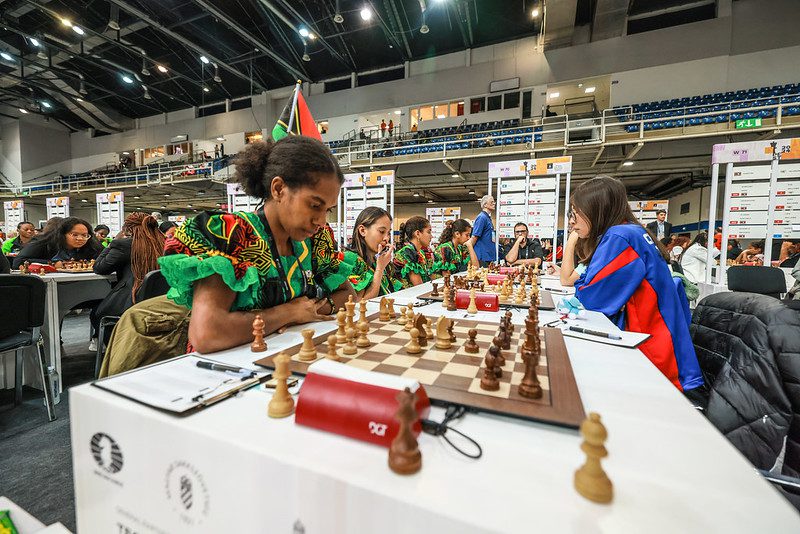


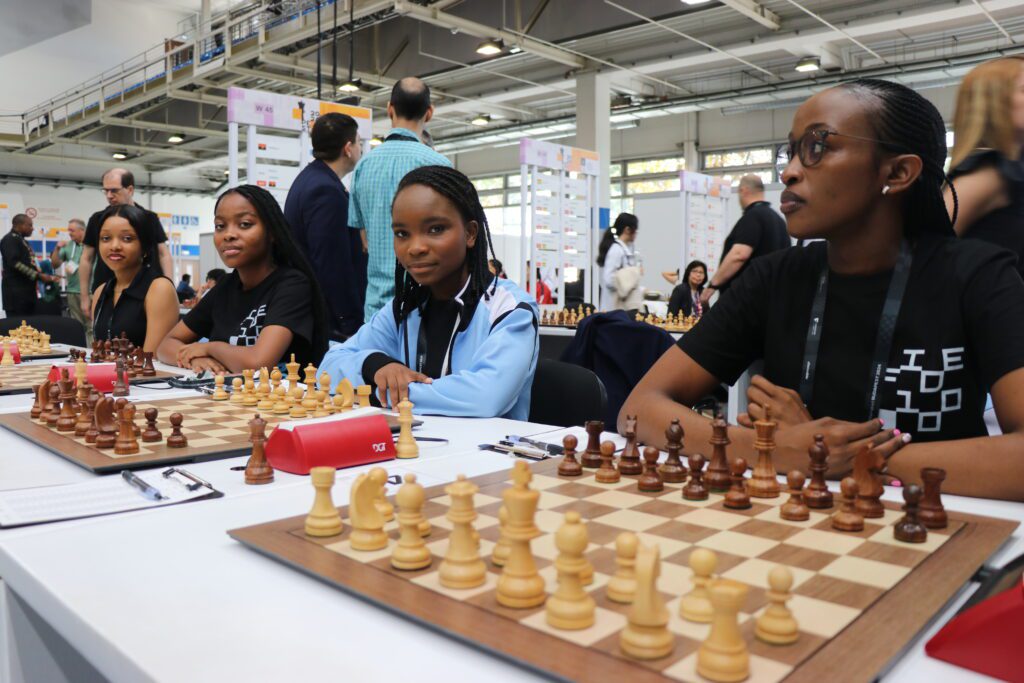
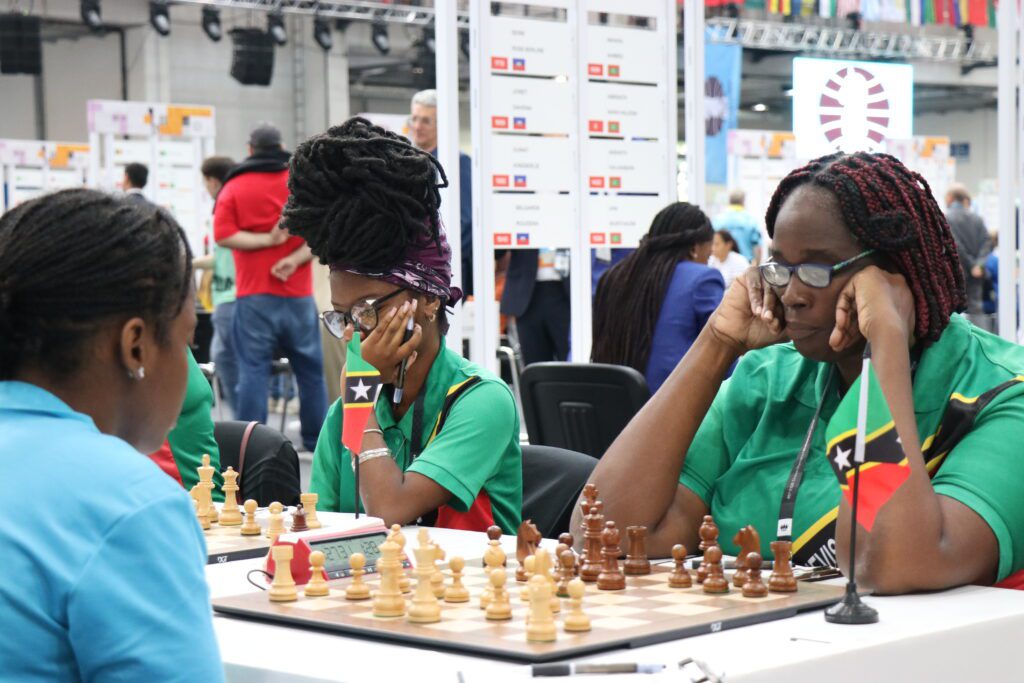
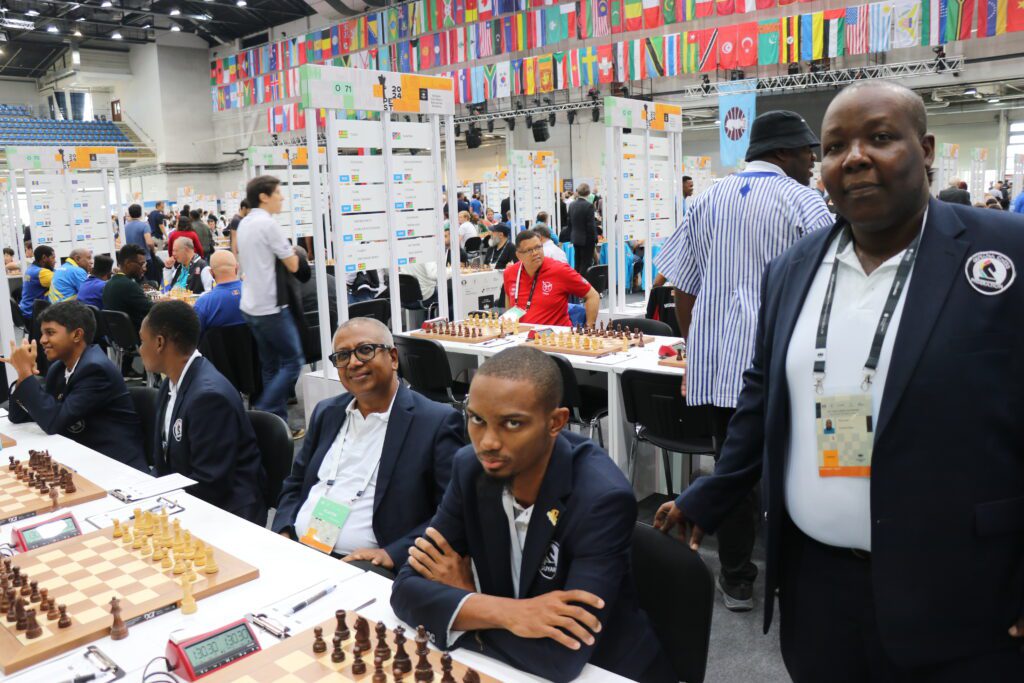





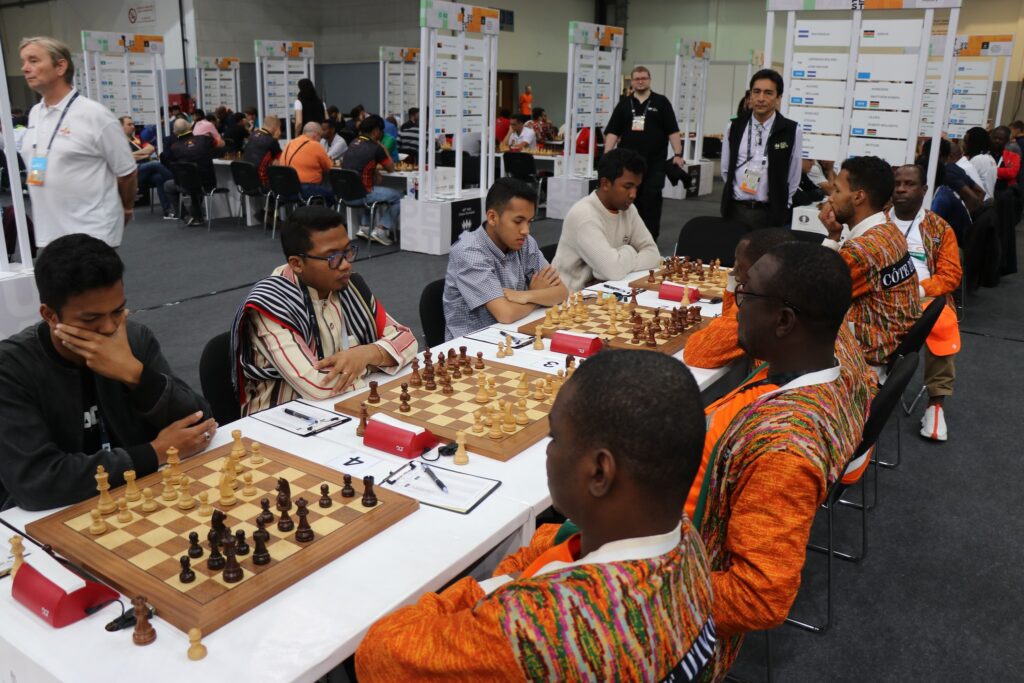



Photos by Daaim Shabazz, Michal Walusza, Michael Lipshitz, Maria Emelianova, Stev Bonhage
Over time, many nations started getting compliments on their outfits, and the national flags at the awards ceremony became an expectation. In Chennai, they had the first “best outfit” contest. With a uniform requirement, the event had a more festive appeal, and nations wore their colors proudly. Many of the teams winning the contest were African and Caribbean teams.
Upsets!
The first round always brings together the powerful nations against those in the lower half. Most matches end as expected, but you are having board upsets more frequently. In fact, Nathaniel Mathurin (1982) of St. Lucia scored an upset win over GM Helge Dam Ziska (2553) of the Faroe Islands, a result that went largely unnoticed. However, Lucian President Tris-Ann Richards went to social media to make the announcement.
Happiness is when when your 1900 player beats a Grandmaster #ChessOlympiad #proudpresident ???? pic.twitter.com/khuuzj1XI6
— Tris-Ann Richards (@3ssAnn) September 12, 2024
Mathurin’s win wasn’t the only cause for celebration. Richards had something to celebrate on her own!
Just won my 7th game in a row, and now I don't know how to act ?. WFM? ??? 7/8. Happy birthday, coach?? #LeonidSandler #ChessOlympiad2024 pic.twitter.com/2tQXZWggEg
— Tris-Ann Richards (@3ssAnn) September 20, 2024
Another game was covered by Nigerian International Master Oladapo Adu. He made a video on a near-seismic upset as Trinidadian FIDE Master Quinn Cabralis (2169) was on the verge of toppling Nodirbek Yakubboev (2666) of defending champion Uzbekistan. It would have been a quality upset of one of the highest-rated players of the event. It turned out that in a winnable position, they repeated moves.
One of the issues with players outrated by hundreds of points is indecision and doubt. Strong players have these problems, but far less frequently. Often, a player in this situation will get a winning position but assume the stronger player has the resources to defend. In this fascinating game, Adu shows how Cabralis lets the Uzbek player snatch a draw from the jaws of defeat.
Video by IM Oladapo Adu
Team Medals!
So how did the teams do? Egypt led African nations, coming in 39th despite missing Ahmed Adly for the event and Bassem Amin for the first six rounds. In the Caribbean, Cuba was the top nation, while Jamaica was the top English-speaking nation. There were some breakout performances, including Zimbabwe, who came in 56th despite being ranked 81st. They won the Category C silver.

Group C (Open)
GOLD-Ecuador
SILVER-Zimbabwe

BRONZE-Tajikistan

Category Results (Team)
Eswatini was renamed from “Swaziland” in 2018. They paraded their new name during the 2018 Chess Olympiad in Batumi, Georgia. They joined FIDE in 2011 and have a couple of Candidate Masters. Mabuza Mbongeni and Simphiwe Dlamini added to the country’s total, earning Candidate Master titles. As a team, they would earn bronze in Category E.

Group E (Open)
GOLD-MyanmarSILVER-Qatar
BRONZE-Eswatini
Category Results (Team)
There was also success in the women’s category with Mozambique earning bronze in Group D. Neusa Aridas De Castro got 7.5/10 with only one loss. Chineva Rufino Sandramo scored 6.5/9 and earned 60 Elo. In Group E, Cameroon, the Cayman Islands, and the Netherlands Antilles took the honors.

Photo by Michal Walusza
Group D (Women)
GOLD-Hong KongSILVER-Thailand
BRONZE-Mozambique
Category Results (Team)

Photo by Daaim Shabazz/The Chess Drum
Group E (Women)
GOLD-CameroonSILVER-Cayman Islands
BRONZE-Netherlands Antilles
Category Results (Team)
Faces in the Crowd!
Adly seems to be more interested in the policy side of chess with the growing academy in Egypt.

Photo by FIDE Chess
There were a few more chess dignataries that I caught up with. I got interviews with long-time acquaintances Dirk Jan ten Guezendam (New in Chess), GM Maurice Ashley, IM Shane Matthews, and Ian Wilkinson, KC, and I was also surprised to see GM Pontus Carlsson. All were here in very different capacities, furthering chess development goals.

Visa Knightmares
While the Budapest Olympiad had many positive aspects, there were also quite a few complaints. Several delegations posted stories concerning accommodations, transportation (to and from the venue), and other logistical snags. Another breaking story was delays in arrival due to visa issues. Chessdom reported that as many as 60 countries had visa delays. By the first round, 40 teams (Open and Women) were not paired.
“there are reasonable doubts as to your intention to leave the territory of the Member States before the expiry of the visa.”
~Embassy of Hungary in Abuja, Nigeria
Most of the countries waiting on visas were from the African continent and the Middle East. Fortunately, another dozen of these countries received visas, but they missed the first few rounds. Nigeria had to assemble a mixed team of four players who were granted visas, one traveling from the U.S. This turned out well since Toritsemuwa Ofowino and Deborah Quickpen had fantastic tournaments on the Open team.
Before we go further, let’s look at the Global Passport Power Index. If you scroll all the way down to the bottom, you will see the countries with the “weakest passports.” Somalia, South Sudan, Syria, Afghanistan were among the rejectees.
A delegation of 17 Somalis traveled to Nairobi, Kenya, to apply for a visa. After spending three weeks in Nairobi awaiting an appeal decision, they were all rejected. The Embassy did not give a reason. This disappointment included tremendous expense in visa application fees, flights to Nairobi, hotel accommodations, and appeal fees. After the rejection, they had to purchase another 17 flights to return to Mogadishu. The entire saga is detailed in the story below.
Nigeria was another unfortunate delegation. Only 7/20 in the delegation and only 3/9 of Nigerian players received visas. Africa Chess Media’s Babatunde Ogunsiku refused to endure an additional expense by paying double for an appeal. He scuttled plans to travel. The letter (with the EU flag at the top) was titled “REFUSAL OF VISA” from “The Embassy of Hungary, Abuja,” and addressed to “OGUNSIKU, BABATUNDE TIMOTHY.”
It affirmed reviewing the application but denied it because he did not provide justification for the trip and did not show “sufficient means of subsistence.” The last point was that “there are reasonable doubts as to your intention to leave the territory of the Member States before the expiry of the visa.”


The rationale seems to be that Ogunsiku’s previous trips to Batumi and the Chennai Olympiads were no proof that he would return. What is implied is that Budapest is a more attractive place to disappear than the others, and the possibility of a visa holder overstaying in an EU country is higher. Embassy and consular officials understand that Nigeria has a lower “Passport Power” ranking and seem to deem it a flight risk. Nevertheless, this is an issue that FIDE should spend more time discussing. Other sports bodies holding international events have succeeded in devising a solution.
Looking Forward!
Many were surprised to see GM Maurice Ashley in Budapest since he was neither a team captain nor a delegate. However, he participated in the FIDE Congress and was also keeping an eye on one of the new prospects in Nigeria’s Deborah Quickpen. She would score 7/8 on the Open team and earn the CM title.

Daaim Shabazz/The Chess Drum
Ashley told The Chess Drum about his new projects involving developing Black talent. He has begun working with talents in the U.S., Caribbean, and Africa. In fact, he is leading a charge to produce the first Grandmaster in his native island of Jamaica.
In 2009, we ran an article titled “What Anand Visit Means to Africa” when Viswanathan Anand visited several African countries. His humble demeanor serves as a source of motivation worldwide, and he remains the ultimate chess ambassador. However, there was very little African media coverage of his visits. Little did the world know that the World Champion was laying the foundation for the talent explosion we now see in India.
India won gold medals at the Olympiad, and the future appears bright as Dommaraju Gukesh will compete for the world championship in November. The world’s most populous nation has nearly 90 Grandmasters, and perhaps there is something smaller federations can learn from India. The Caribbean has increased its chess footprint and countries like Dominica, the Cayman Islands, St. Lucia and St. Kitts are ready to supplant Jamaica, Barbados and Trinidad as the traditional regional powers.

Photo by Michal Walusza
Final Expressions
Photos by Daaim Shabazz/The Chess Drum
Why is all of this important? Why is it important to highlight the African Diaspora? Why is it important to highlight Black players in chess? Why is it important to highlight the smaller federations? These elements represent the growth of chess. The growth of chess has blossomed in Asia, and it is time for the other regions to follow so chess can have more widespread acceptance.
Brewington Hardaway will most likely be the next Grandmaster in the African Diaspora, and hopefully, we will see similar progress leading up to Uzbekistan in 2026. Let’s look at chess initiatives leading to success in the African Diaspora!





















